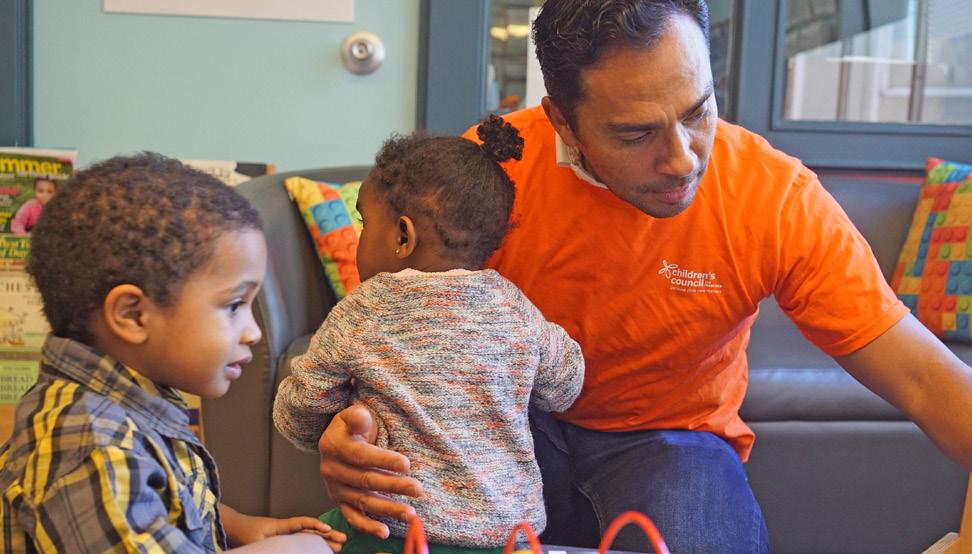PUBLIC POLICY PRINCIPLES



Children’s Council of San Francisco is committed to advocating for a San Francisco where every child reaches their full potential and thrives through providing integrated services that align with the WHOLE FAMILY/ WHOLE CHILD model of care. It takes a village to raise a child and it takes an integrated community of service providers to enhance the resilience of children and their families.
So, by advocating for quality early care and education we work to provide all San Franciscans with affordable access to early care & education in San Francisco, empower families with information and financial support, and expand the capacity and training of early educators and caregivers in San Francisco.
These Public Policy Principles align with Children’s Council’s 2020-2025 Strategic Plan, Core Focus Area 4: Advocacy, Community Engagement & Coalition Building, which states the creation of an external-facing policy agenda as a key strategy.
We are dedicated to addressing unmet child care needs and improving access to services for all children 0–5, especially infants and toddlers from diverse communities and those with special needs, while ensuring geographic and socioeconomic equity. Our priority is to preserve and protect the existing child care delivery system while also making necessary innovations, changes and expansions to meet the needs of San Franciscans today.
Children are the center of Children’s Council of San Francisco’s work which is why we uplift the Whole Family/ Whole Child model of care to advocate for the following policy principles:
Expand Access to Child Care in San Francisco:



We are working towards a universal child care system in San Francisco where all families have access to affordable early care & education that meets their specific family needs.
• Preserve, protect and expand local, state and federal investments in early care & education.
• Advocate for local, state and federal investment in early care & education that result in the expansion of child care and/or an increase in quality of care for children.
• Maximize blended one-time and ongoing local, state and federal dollars to provide parental choice and access to diverse high quality child care options that support the real working needs of families employed in California 24 hours per day, 7 days per week.
• This includes access to license-exempt providers, who are the traditional social network of Family, Friend and Neighbor (FFN) caregivers.
• Full funding for all families in need of child care subsidies with fair and reasonable family fees for those earning above 75% State Median Income (SMI).
• Fair and reasonable family fees should not be higher than 7% of a family’s income.
Build, Strengthen and Maintain Relationships with Government and Community Partners:
Engage policy makers, business leaders, families, providers and other stakeholders as partners in advocating to meet the needs of children age 0-5 and their families.
• Meet and engage regularly with government officials to educate them on budgetary and legislative Early Care & Education and family support needs.
• Build and strengthen coalitions with partner organizations to advance targeted legislation and budget items at the local, state and federal levels.
• Engage with constituents to inform our own advocacy and coalition-building priorities
• Partner with family resource centers and other family support and service networks in San Francisco to enhance access and affordability for family supports.


• Maintain and expand seats at the table on key advocacy groups at the local, state and federal level to support ECE efforts.
• Meet with federal representatives once per year and engage in national organizing conferences related to child care.
Protect Parental Decisions of Caregiver and Care Settings:
Children learn in various settings; we aim to empower parents/caregivers and provide them with access to make the choice that works best for their children and family needs.
• Advocate for access to culturally competent child care settings.
• Advocate to allow families to use local dollars for Family, Friends and Neighbor (FFN) care in a license-exempt setting if it is the only care that meets their needs, particularly for care outside of traditional working hours.
• Encourage the City of San Francisco to align with federal regulations that mandates parental choice.
• Advocate for resources and additional funding to increase quality in every type of child care setting – including Family, Friends and Neighbors (FFNs) to better prepare children for kindergarten.

Ensuring a Whole Child/Whole Family Approach to the Child Care Ecosystem:



It takes a Whole Child/Whole Family model of care to fully meet the needs of 0-5 children. Children’s lives are not and cannot be separated from the lives of their families. A Whole Child/Whole Family model of care includes full wrap-around services for 0 -5 children and their families, especially when they are at their most vulnerable.

Wrap-around services include family workshops and trainings, resources for other essential social services and checking in on a regular basis with families to ensure they are getting the services and results they need. Working towards a comprehensive and integrated delivery system of information and services to promote Early Care & Education will benefit all children and families in San Francisco.
• Map current support services for children age 0-5 both within and outside child care settings to clearly understand the services currently offered as well as the gaps we can advocate for.
• Advocate for family programming and resources that provide families with more socioeconomic security and tools to care for their young children
• Educate community on the importance of the Whole Child/Whole Family approach for children age 0-5.
445 Church Street, San Francisco, CA 94114 | childrenscouncilsf.org
